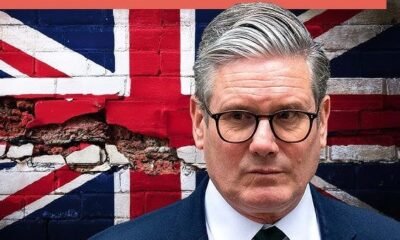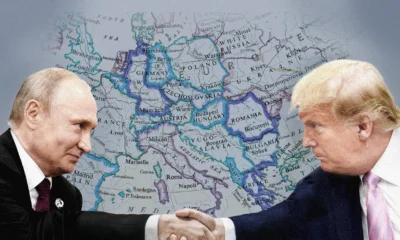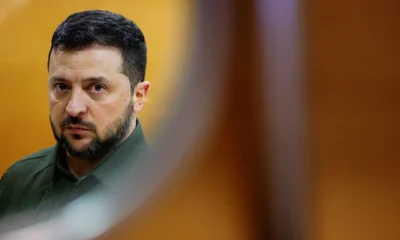Politics
Trump’s Bold Gaza Plan Receives Netanyahu’s Backing. Will The World Allow Gaza’s Future To Be Shaped By Foreign Interests, Or Seek A Just Solution For Palestinians?
Israeli Prime Minister Benjamin Netanyahu has given his endorsement, calling it “the only viable plan to enable a different future.”
Published
8 months agoon
The recent discussions surrounding Donald Trump’s controversial proposal for Gaza have triggered a mix of shock, criticism, and concern. In a move that could reshape the political gambit of the Middle East, Trump’s plan to evacuate Palestinians from Gaza and redevelop the area under U.S. ownership has been met with fierce opposition from Palestinians, human rights organizations, and even some of the U.S.’s traditional allies. However, Israeli Prime Minister Benjamin Netanyahu has given his endorsement, calling it “the only viable plan to enable a different future.”
The Controversy. Is It Ethnic Cleansing?
The term “ethnic cleansing” is a heavy accusation, one that many believed would be relegated to the dark corners of history. Yet, as recent reports surface, Netanyahu has shown strong support for Trump’s plan to forcibly move Palestinians out of Gaza. Critics have raised alarm over the potential human rights violations and the catastrophic consequences for the Palestinian population. Netanyahu, however, has rejected these claims, insisting that emigration would be voluntary despite the Israeli government’s military actions in Gaza that have left the region decimated.
This brings us to a critical issue- the displacement of Palestinians. The land issue has been one of the most divisive and painful aspects of the Israeli-Palestinian conflict ever since the United Nations voted in 1947 to divide Palestine into two states—one Jewish, one Arab. The history of land ownership and control remains at the heart of the conflict.
The U.S. Factor. Trump’s Influence
President Trump, as always, has been unapologetically bold in his approach. In a recent statement, he emphasized his close working relationship with Netanyahu, stating, “You do whatever you want,” referring to Israel’s autonomy in deciding the future of Gaza. While the Israeli prime minister acknowledged this endorsement, he also emphasized that the U.S. president’s vision for Gaza was “right on the dot,” further solidifying the strategic partnership between the two.
However, the dynamics between the U.S. and Israel are complicated. The Biden administration had previously blocked the sale of heavy bombs to Israel out of concern for the potential destruction they could cause in Gaza. Yet, Trump’s decision to greenlight the shipment of MK-84 bombs signals his belief in “peace through strength,” a stance that continues to spark heated debates about the role of military force in resolving political disputes.
Heavy Bombs and the Escalating Ceasefire Tensions
The U.S. has recently delivered the MK-84 bombs, which are designed to pierce thick concrete and metal. These bombs have the potential to cause widespread devastation in densely populated areas like Gaza. This delivery has only escalated concerns about the fragile ceasefire, which temporarily halted hostilities between Israel and Hamas after nearly 16 months of fighting. The ceasefire’s first phase is set to end in the coming weeks, and negotiations for the second phase are already under way.
The situation remains precarious. Thousands of lives have already been lost in the ongoing conflict, and the unresolved humanitarian crisis in Gaza continues to worsen. More than 48,000 Palestinians have been reported killed, while Israel has faced its own losses, with over 1,200 people killed and hundreds taken hostage during Hamas’s initial attacks on Israel.

The Role of International Mediators
While the U.S. and Israel may have aligned goals for Gaza, other regional players, including Egypt and Qatar, are working to mediate peace talks and propose alternatives. Egypt, in particular, is expected to present a plan within weeks that could involve creating a new Palestinian security force and appointing local leaders. Yet, the U.S. has made it clear that Hamas, which it considers a terrorist organization, cannot play any role in Gaza’s future.
In the meantime, tensions are also rising on the ground. Over the weekend, three Palestinian police officers were killed in Rafah, reportedly by Israeli forces. This incident has added further weight on the ongoing ceasefire discussions and spotlights the difficulty of maintaining peace in a region fraught with violence.
Rubio’s Middle East Tour
In parallel with these developments, U.S. Secretary of State Marco Rubio has launched his Middle East tour, reaffirming the U.S.’s strong support for Israel. Rubio has been outspoken about Iran’s role in destabilizing the region and has warned of repercussions if neighboring countries, like Egypt and Jordan, do not accept displaced Palestinians. The rhetoric surrounding Trump’s Gaza plan has certainly heightened regional tensions, with many fearing that the proposal could lead to further instability in an already volatile region.
The Verdict
It’s hard to believe, but not too long ago, mainstream media outlets were rushing to crown Donald Trump as the new “peacemaker,” especially following his Middle East envoy Steven Witkoff’s involvement in securing a Gaza ceasefire. Amidst this optimism, Trump even boasted that his ‘proudest legacy’ would be that of uniting nations in peace.
At the same time, however, his cabinet was stacked with figures whose loyalties lay firmly with Israel’s far-right, including those openly advocating for annexing the West Bank and backing Israel’s brutal actions in Gaza.
The hope that Trump would genuinely foster peace in the region was always ‘to good to be true’ but the recent harsh reality has delivered a rude awakening.
Trump’s open support for Israel, and his unequivocal green light for further military intervention in Gaza, has shattered any illusion of neutrality or peace-building. Just days ago, Trump shocked the world by unveiling a plan to ‘take over Gaza,’ sending US troops to forcibly expel Palestinians and build a so-called ‘Riviera of the Middle East’ on the very ruins of their destruction.
In a press conference with Israeli Prime Minister Netanyahu standing proudly beside him, Trump’s plan received an eager endorsement from Israel’s far-right. Right-wing figures like Itamar Ben Gvir and Bezalel Smotrich celebrated the announcement, hailing it as a major victory for Israel’s long-term goals. Netanyahu, feeling backed into a corner, couldn’t have been more grateful for this unexpected lifeline.
While the announcement sent shockwaves through the international community, it wasn’t exactly a surprise to those who had been paying attention. Trump’s rhetoric had made it clear for a while that he was prepared to take the most aggressive stance in favor of Israel, regardless of the cost to Palestinians. However, even amongst the US’s closest allies, such as the UK and Ireland, there was reluctance to fully confront or condemn the plan. They may have voiced concerns, but none were bold enough to challenge Trump outright, fearing the wrath of his administration.
In the West, however, some voices of opposition have emerged. Palestinian representatives immediately condemned Trump’s plan as a blatant effort to erase the Palestinian cause, while figures like Jeremy Corbyn and Rashida Tlaib decried it as ethnic cleansing. Still, these critiques remain isolated in the mainstream, while the rest of the political establishment seems ready to swallow their objections and fall in line behind Trump’s vision.
Even more concerning is the response from the Arab world, where Trump’s declaration risks worsening already boiling tensions. Governments in Egypt, Jordan, and Saudi Arabia, who have spent years maintaining a delicate balance between their populations and US interests, now face a difficult question – how far will they go in appeasing Washington without sparking widespread unrest? Trump’s reckless maneuver could ignite massive discontent in the region, threatening the very stability that these US-aligned regimes have worked so hard to maintain.
Ultimately, Trump’s Gaza plan marks a dramatic shift in US foreign policy, it signals the end of any pretense of impartiality and the embrace of an openly imperialist stance. His actions reveal the dangerous lengths to which the US government will go to support its allies in Israel, regardless of the human cost. More than ever, the global mass movement in solidarity with Palestine must push back against imperialism, recognizing that Palestinian liberation is a cornerstone of the broader struggle for justice across the Middle East—and beyond.
This seems to be no longer just about Gaza.

The Last Bit
As the situation continues to evolve, the fate of Palestinians in Gaza remains uncertain. The prospect of a mass exodus, military aggression, and geopolitical maneuvering leaves little room for optimism. Whether Trump’s plan will succeed in “changing the future” for Gaza or further aggravate the region’s suffering remains to be seen. With Netanyahu’s support and Trump’s unwavering stance, Palestinians may face an even harsher reality in the months and years to come.
At its core, this issue isn’t just about land or politics—it’s about human lives, dignity, and the future of an entire population. As the world watches – will the international community stand by as Gaza is reshaped according to foreign interests, or will there be a push for a more peaceful, just solution for Palestinians?

You may like
-


Taiwan’s ‘Historic’ TSMC Deal, A Win Or The End Of Its ‘Silicon Shield’ As China Threatens? A Jittery Taiwan Watches Trump’s Moves On Ukraine, Wondering, Could We Be Next?
-


America And China’s Thirst For Gold In 2025 Is Draining Other Countries’ Reserves; Here’s Why?
-


Germany’s Friedrich Merz’s Big Balancing Act—Trump, Borders & Europe’s Future. Can He Deliver?
-


United Kingdom To Unleash Its ‘Harshest’ Sanctions On Russia Yet—But Will They Bite? How Trouble Is Brewing For Keir Starmer At Home. Shamed For Volunteering British Troops In Ukraine
-


How It’s Not Trump But Vladimir Putin That Europe Is Stinging From: Trump’s U-Turn On Europe, Russia’s Strong Supply Chain—A Formidable Opponent!
-


Is Ukraine Now Stuck In The US-Russia Ecosystem? Could Zelensky Have Made A Deal To Stop The War, Is Trump Right?